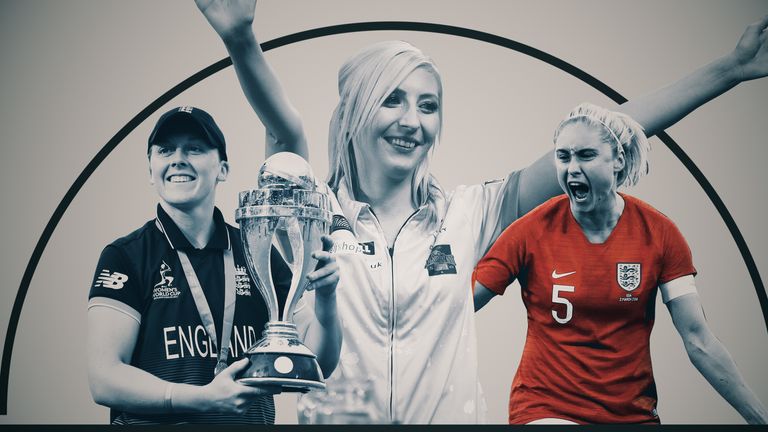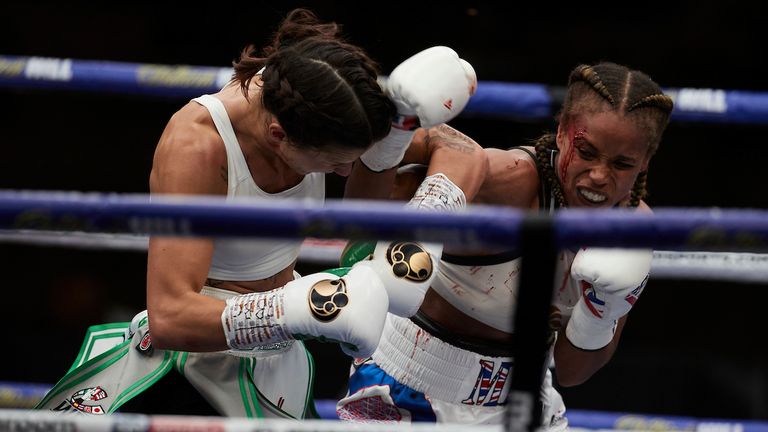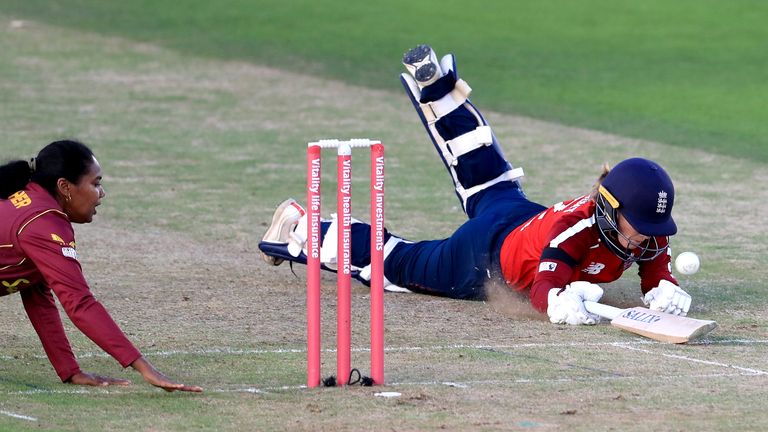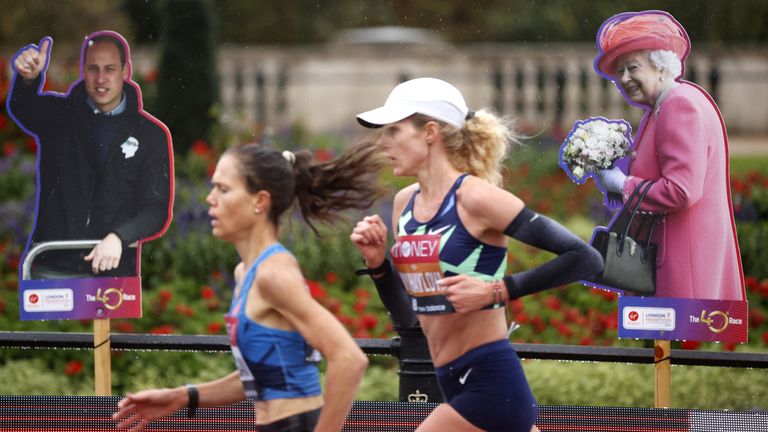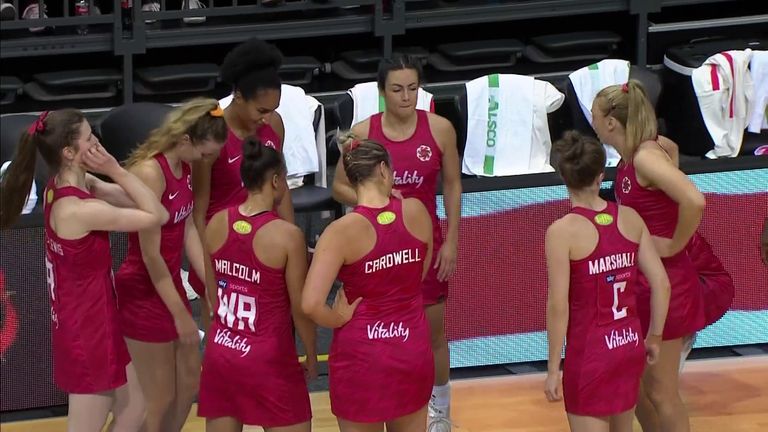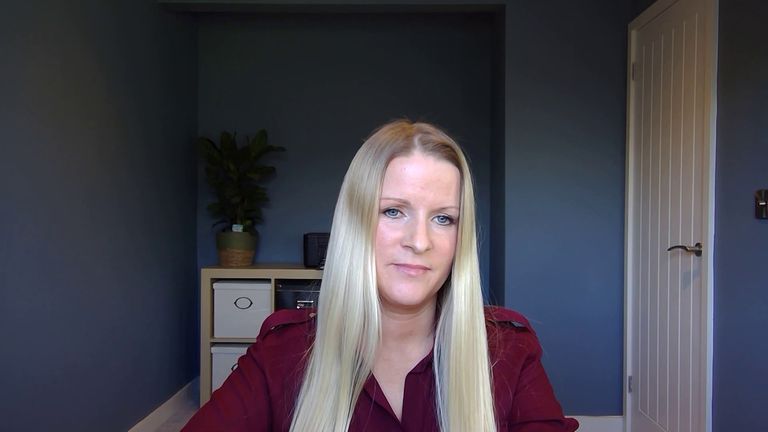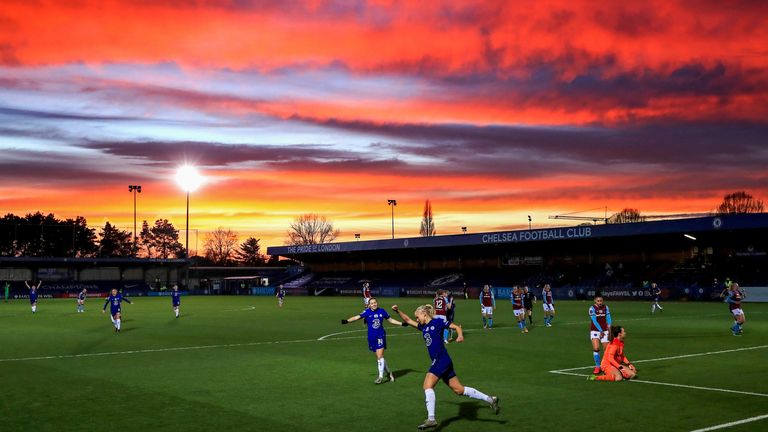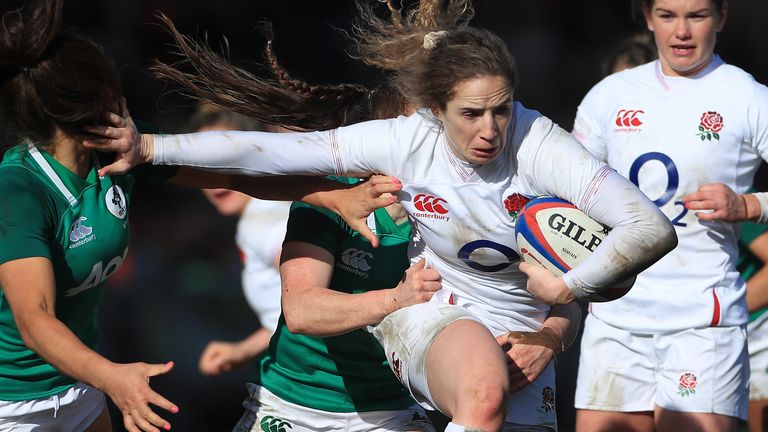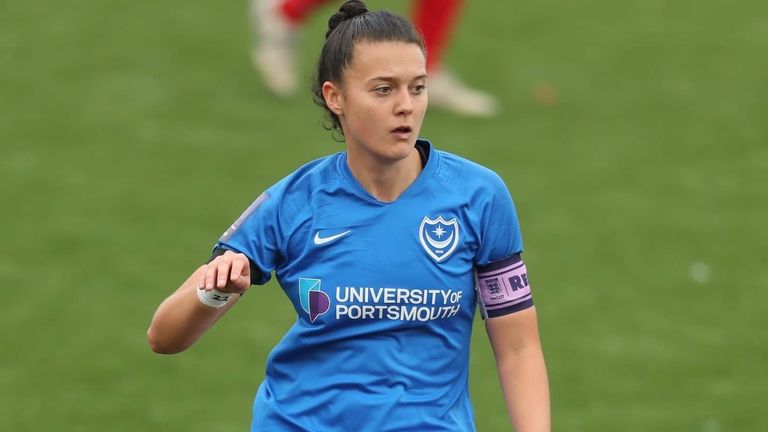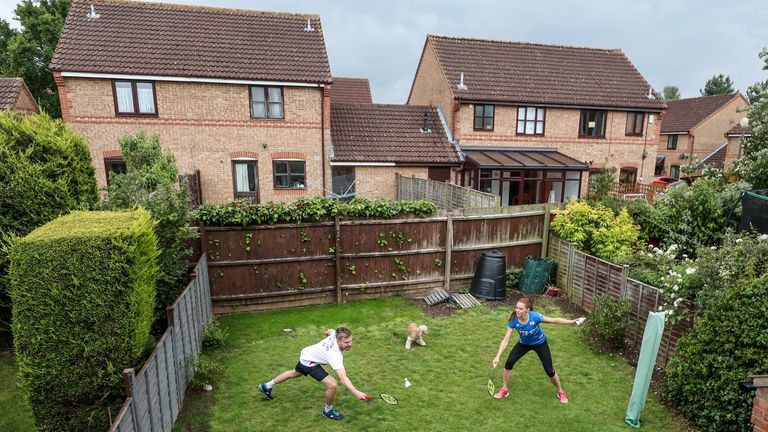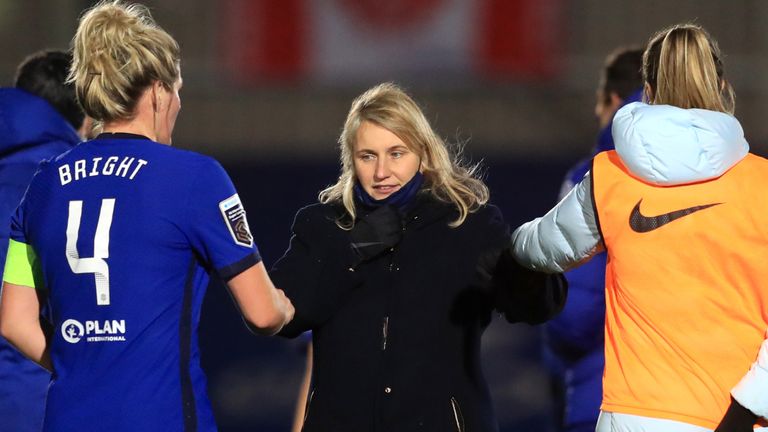Women's Sport: 80 per cent of female athletes say growth hindered during pandemic by inequalities with men's sport
New research says two-thirds of elite female athletes are concerned about pandemic's long-term financial impact; top sponsor warns of a "gender play gap"; Dept for Digital, Culture, Media & Sport say more support to be announced soon and add "women's sport must not take a back seat again"
Wednesday 10 February 2021 21:41, UK
Eighty per cent of female athletes believe the growth of women's sport during the pandemic has been hindered by inequalities compared with men's sport, a new report has found.
Research carried out by Nottingham Trent University and shown exclusively to Sky Sports News has revealed the worries elite athletes have about their future in sport.
One of the biggest sponsors has also told us they are concerned about a "gender play gap" which could undo the progress in recent years.
Pre-pandemic women's sport was booming with the Lionesses winning the 2019 She Believes Cup, Fallon Sherrock's incredible run at the World Darts Championship and England winning the Cricket World Cup.
But for many female athletes, the lockdown has been tough. Boxer Natasha Jonas has faced the demands of having to juggle work and childcare as a single mum. In August she took part in a WBC world title fight against Terri Harper. Millions watched from home, but now there are questions and uncertainty about what is next.
She told Sky Sports News: "Financially, it is tough worrying about when your next fight is going to be, especially when the board called all boxing off until late February. You know, there are no fights on the horizon. I am not contracted to anyone. It is financially a worry."
Steph Houghton is the captain of England and Manchester City. The Lionesses haven't played a competitive game in almost a year, although they have now secured two matches against Northern Ireland and Canada to be played in the coming months.
"We were getting more fans through the gates and obviously we were building momentum," Houghton said, reflecting on life before the pandemic.
"I think in terms of playing Germany at Wembley last year and nearly selling out the stadium that is where you're probably thinking 'right OK, everyone is taking notice of women's football and women's sport'.
"For me personally as a sports fan, ultimately if I get the opportunity to go and watch a football game I am grabbing it with both hands when this is all over."
'Women athletes have many worries'
New research by Nottingham Trent University, due to be published this year, found 80 per cent of elite female athletes noted the growth of women's sport was hindered by inequalities between men's and women's sport.
Other findings include 66 per cent having concerns about the long-term financial implications of coronavirus and 91 per cent of elite female athletes surveyed believe pay is unequal between the sexes.
Dr Ali Bowes, senior lecturer in the Sociology of Sport, is following up from her initial findings last year which showed the first lockdown affected elite women athletes who struggled to access equipment and facilities, and there was a "prioritisation of men's sport, and women athletes felt forgotten about during the initial lockdown".
Dr Bowes' new work investigates the effects of the ongoing pandemic. She said: "Research we are about to publish shows that women athletes have many worries about the impact of the pandemic, but are mainly concerned about the long-term financial impact on sport.
"This was often aligned with concerns about both the quantity and quality of media coverage. Disparities were exaggerated when men's sport was able to restart much earlier, and since then, more consistently.
"The pandemic has really opened up conversations about gender inequality in sport. It emphasised the difficulties many elite sportswomen face, and in calling those out - from issues around competition cancellations, 'elite' football academies, testing, funding and TV coverage - it provides a possibility for stakeholders to reconsider their approach to women's sport.
"I think the future could look bright, but there is a need for broader cultural changes regarding women's and girls' involvement in sport, including normalising women's sport as simply 'sport'."
'The gender play gap'
For big names like US World Cup winner Alex Morgan, world champion Dina Asher-Smith and Grand Slam champion Naomi Osaka, advertising is key. It is also crucial for the development of major leagues and competitions.
One of the biggest investors in women's sport has found that coronavirus has created the "gender play gap", with it being harder for women to be physically active than men.
Managing director of the Vitality Programme Nick Read is concerned the pandemic could affect the big progress made in recent years, such as the 2019 Netball World Cup.
He said: "Some of the stats that have come out off the back of that, in terms of the women and girls returning to netball has been absolutely staggering so over 200,000 were inspired to play netball again, over five million said that the Vitality Roses were an inspiration to them and so we were very concerned that that momentum and that media support would disappear.
"And what we've seen as well through Covid, through research of our own and also through partners such as Women In Sport is that there has been this 'gender play gap' - it has been much harder for women to be physically active during this time than it has been for men and that is something that has been a concern for us.
"There's absolutely nothing standing in our way at the moment and we are truly committed to women in sport. We made a big play over the last few years with netball, with cricket, with women's football and even during Covid, we have a number of very exciting announcements to further our support and pioneer and champion women in sport."
Barclays, who sponsor the Women's Super League, point out that things are difficult at all levels of women's football at the moment but believe the game can prosper in the future.
A spokesperson said: "Eighteen months on and we haven't been disappointed despite all the problems everyone is facing through Covid. The first season saw high-level competition, record crowds, and despite the season ending early, the game has developed further and has attracted some of the top players in the world to join this season.
"Research showed us the difference football makes to girls' personal development, building confidence and helping develop skills, and we were delighted to sponsor the FA Girls' Football School Partnerships at the same time, with the ambition of giving all girls the opportunity to play football in school by 2024.
"At the moment, things are difficult at all levels of the game but we do think the game can prosper in the future and we want to be part of its development."
'Brands to reap rewards for sticking with sport'
The question is, with a fragile economy, will sponsorship be affected post-pandemic?
Carolyn Rich, head of brand marketing and social responsibility at Allianz, insists there is a role for big brands to play in order to elevate women's sport.
"We see the way women's sport is progressing in terms of audience and reach; it makes for very positive and encouraging viewing. That is why we sponsor the Red Roses England team, Allianz Premier 15s domestic competition and Inner Warrior grassroots programme aimed at growing women and girls' rugby in England.
"We see the numbers of viewers and participants of women's rugby at grassroots and league level increasing and we want to be there supporting the next generation of female sporting stars. With our long history in the sport and our commitment to champion environments where diversity is celebrated, you could say that it was a no-brainer for us to invest."
Steve Martin, the global CEO of international advertising agency M&C Saatchi, has a positive outlook.
"A lot of brands are renewing their partnerships because they see the opportunity in women's sport. It has such a big audience," he said.
"It is over 50 per cent of the population and if you look here 90 per cent of the Australian population watch women's sport, so there are huge commercial benefits and I think some of the sponsored brands that have stuck with sports are the ones that will reap the rewards."
'Why are we classed as sub-elite?'
Not all sports and leagues get the necessary funding. For Portsmouth women's football team, times are particularly tough. They haven't played since the second lockdown in November.
Pompey captain Jade Bradley said: "Mentally it is hard to carry on, to push yourself when this is your third lockdown and your third time out of football, when all you want is to play.
"The majority of the girls, their lives revolve around training and games. You know, you work longer hours on one day so you can get off work early and go to training the next.
"In terms of the effort and the hours that go into our league and what we're classed as, which is the breakthrough to the next leagues - the Championship and the Super League, it just doesn't make sense. There are players in our league that are internationals. So if they're classed as a sub-elite, then I don't know what elite is."
Paralympic sport has also been badly affected. Dame Sarah Storey was preparing for the Paralympic Games in Tokyo last year, before they were postponed along with the Olympics.
"It is a challenge and it makes it really difficult," she said.
"If you are also someone who has an underlying health condition or your disability puts you at more of a risk, it may be that you have to choose whether or not to race at some of the more local events and the longer you stay at home, the longer you don't go somewhere, the more anxiety is connected to leaving the house for the first time."
'We are alive to pressure women's sports are facing'
Responding to this story, a spokesperson for the Department for Digital, Culture, Media and Sport said: "We are absolutely committed to supporting women's sport at every opportunity - pushing for greater participation, employment, commercial opportunities and visibility in the media. The past few years have seen fantastic progress, and Sky Sports has been at the heart of this.
"We are alive to the pressures that women's sports are facing. Clubs and sports bodies have benefited from the multi-billion pound package of Government support that has been made available, and more targeted support will be announced very shortly. We are clear that women's sport must not take a back seat again."
In November, the Government announced that women's football (WSL and Championship) and netball had been provisionally allocated funding from the £300m Sports Winter Survival Package to help major spectator sports badly affected by coronavirus restrictions.
£3m would go towards women's football, £4m for netball, and women's British Basketball League teams would also get help from some of the £3m support provided.
'Women's sport and fitness left behind'
Chair of the Women and Equalities Select Committee Caroline Nokes MP believes the focus on men's football has affected women's sport.
She said: "Women's sport and fitness has been left behind during the pandemic, with a focus on the Premier League above pretty much every other sport.
"Throughout the pandemic, I have spoken to fitness instructors, yoga and Pilates teachers, dance school owners and trampoline clubs who all feel left behind. The Government needs to make sure, as we come out of this lockdown, that women's sport is not forgotten.
"It's all very well to have an escape plan for golf and fishing, but it cannot come at the expense of sports that women participate in and need to get back to."
Julian Knight MP, the chair of the Digital, Culture, Media and Sport Select Committee, is watching the progress of women's sport very closely.
"There is a bit of an initial feeling perhaps at the start of the pandemic they were treated slightly in a second-class way. We're keeping a very close eye on that," he said.
"I hope that we don't have to call people in [to give evidence] about it. We may look at exactly what is happening right now in terms of the support for women's sport.
"We understand there are economics at stake but also there are bigger issues as well in terms of participation and ensuring we have true equality in sport and that sometimes means that you have to take a bit of a financial hit in order to bake in that equality."
Women's sport has clearly suffered during the coronavirus pandemic, with athletes and sponsors worried about losing the momentum and profile it had before lockdown. But there is also hope that when it does fully return after the pandemic, it will be even bigger and better and will continue to grow.
Sky Sports is your home of netball. The Vitality Netball Superleague returns on February 12 with a 10-match weekend of netball. Every contest will be available to watch across Sky Sports, the Sky Sports YouTube channel, or England Netball's YouTube channel.
